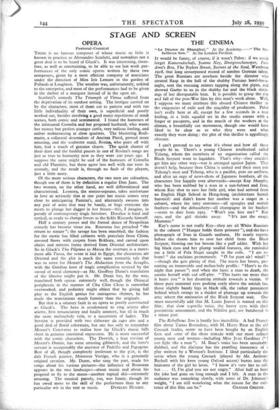STAGE AND SCREEN
OPERA
Pastoral-Comical
THERE is no famous composer of whose music so little is known in practice as Alessandro Scarlatti, and nowadays not a great deal is to be heard of Gluck's. It was interesting, there- fore, as well as entertaining, to be able to see last week per- formances of the only comic operas written by these two composers, given by a most efficient company of musicians under the direction of Miss Iris Lemare in the garden of Pollards at Loughton. The weather was, unfortunately, unkind to the enterprise, and most of the performances had to be given in the shelter of a marquee instead of in the open air.
Scarlatti's comedy The Triumph of Virtue suffered from the deprivation of its outdoor setting. The intrigue carried on by the characters, most of them cut to pattern and with too little individuality of their own, is superficial and poorly worked out, besides involving a good many repetitions of stock scenes, both comic and sentimental. I found the humours of the infatuated Cornelia and her proposed husband, who wants her money but prefers younger cattle, very tedious fooling, and rather embarrassing at close quarters. The blustering Rodi- marte, a collateral descendant of Ancient Pistol, proved more amusing, and the soubrette maid, Rosins, who pairs off with him, had a touch of genuine charm. The quick chatter of their duet and the bashful pauses in one of Rosina's songs are just as true to humanity now as they were zoo years ago. I suppose the same might be said of the humours of Cornelia and old Flamini°, but these agree less well with our taste in comedy, and the result is, through no fault of the players, just a little nasty.
Of the more serious characters, the two men are colourless, though one of them is by definition a regular Don Juan, The two women, on the other hand, are well differentiated and characterised. Leonora, the mezzo-soprano, takes misfortune in love so seriously that at one point her music comes very close to anticipating Pamina's, and alternately swoons into any pair of arms that may be handy, or begs everyone she meets to plunge her dagger in her breast—this, I imagine, in parody of contemporary tragic heroines. Doralice is hard and cynical, as ready to change lovers as the fickle Riccardo himself.
Half a century passes and the formal dance of Neapolitan comedy has become vieux jeu. Rousseau has preached "the return to nature "; the savage has been ennobled; the fashion for the exotic has filled cabinets with porcelain from China, covered floors with carpets from Bokhara, and carved upon chairs and mirrors forms derived from Oriental architecture. So in Gluck's The Pilgrims to Mecca the overture is a move- ment alla Turca, the scene is laid in Egypt, the characters are Oriental and the plot is much the same romantic tale that was to serve for Mozart's The Abduction from the Seraglio, with the Gordian knot of tragic complication severed by the sword of royal clemency—as Mr. Geoffrey Dunn's translation of the libretto might put it. Mr. Dunn has, by the way, translated both operas extremely well, though the Oriental periphrasis in the manner of Chu Chin Chow is somewhat overworked, and pedantry might object that by giving full play to the English genius for outrageous rhymes, he has made the translations much funnier than the originals.
But that is a salutary fault in an opera so poorly constructed as Gluck's. The hero is condemned to sing ariette after ariette, first renunciatory and finally amatory, but all in much the same melancholy vein, to a succession of ladies. The heroine is provided with two elaborate da capo airs and a good deal of florid coloratura, but one has only to remember Mozart's Constanze to realise how far Gluck's music falls short in genuine emotional expression. He is more successful with the comic characters. The Dervish, a lean version of Mozart's Osmin, has some amusing gibberish, and the hero's servant is recognisably the ancestor of Pedrillo and Papageno. Best of all, though completely irrelevant to the p'_ot, is the daft French painter, Monsieur Vertigo, who is a genuinely original creation. Mr. Dunn, who sang the part, made his songs about his various pictures—the influence of Rousseau appears in the two landscapes—about music and about his proposal to fly to the moon—another topical skit—extremely amusing. The musical parody, too, was funny, though its fun owed more to the skill of the performers than to any








































 Previous page
Previous page